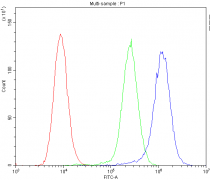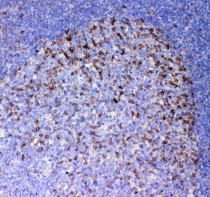ARG58112
anti-CD278 / ICOS antibody
anti-CD278 / ICOS antibody for ELISA,Flow cytometry,IHC-Formalin-fixed paraffin-embedded sections and Human
Overview
| Product Description | Rabbit Polyclonal antibody recognizes CD278 / ICOS |
|---|---|
| Tested Reactivity | Hu |
| Tested Application | ELISA, FACS, IHC-P |
| Host | Rabbit |
| Clonality | Polyclonal |
| Isotype | IgG |
| Target Name | CD278 / ICOS |
| Antigen Species | Human |
| Immunogen | Recombinant protein corresponding to aa. E21-K140 of Human CD278 / ICOS. |
| Conjugation | Un-conjugated |
| Alternate Names | CD antigen CD278; CD278; Inducible T-cell costimulator; AILIM; Activation-inducible lymphocyte immunomediatory molecule; CVID1 |
Application Instructions
| Application Suggestion |
|
||||||||
|---|---|---|---|---|---|---|---|---|---|
| Application Note | IHC-P: Antigen Retrieval: Steam tissue section in Citrate buffer (pH 6.0) for 20 min followed by cooling at RT. * The dilutions indicate recommended starting dilutions and the optimal dilutions or concentrations should be determined by the scientist. |
Properties
| Form | Liquid |
|---|---|
| Purification | Affinity purification with immunogen. |
| Buffer | PBS, 0.025% Sodium azide and 2% Trehalose. |
| Preservative | 0.025% Sodium azide |
| Stabilizer | 2% Trehalose |
| Concentration | 0.5 mg/ml |
| Storage Instruction | For continuous use, store undiluted antibody at 2-8°C for up to a week. For long-term storage, aliquot and store at -20°C or below. Storage in frost free freezers is not recommended. Avoid repeated freeze/thaw cycles. Suggest spin the vial prior to opening. The antibody solution should be gently mixed before use. |
| Note | For laboratory research only, not for drug, diagnostic or other use. |
Bioinformation
| Database Links | |
|---|---|
| Gene Symbol | ICOS |
| Gene Full Name | inducible T-cell co-stimulator |
| Background | The protein encoded by this gene belongs to the CD28 and CTLA-4 cell-surface receptor family. It forms homodimers and plays an important role in cell-cell signaling, immune responses, and regulation of cell proliferation. [provided by RefSeq, Jul 2008] |
| Function | Enhances all basic T-cell responses to a foreign antigen, namely proliferation, secretion of lymphokines, up-regulation of molecules that mediate cell-cell interaction, and effective help for antibody secretion by B-cells. Essential both for efficient interaction between T and B-cells and for normal antibody responses to T-cell dependent antigens. Does not up-regulate the production of interleukin-2, but superinduces the synthesis of interleukin-10. Prevents the apoptosis of pre-activated T-cells. Plays a critical role in CD40-mediated class switching of immunoglobin isotypes (By similarity). [UniProt] |
| Calculated MW | 23 kDa |
| PTM | N-glycosylated. [UniProt] |
Images (2) Click the Picture to Zoom In
-
ARG58112 anti-CD278 / ICOS antibody FACS image
Flow Cytometry: Raji cells stained with ARG58112 anti-CD278 / ICOS antibody at 1 µg/10^6 cells (cells blocked with goat sera). Red: Cells alone, Green: Isotype control, Blue: Primary antibody.
-
ARG58112 anti-CD278 / ICOS antibody IHC-P image
Immunohistochemistry: Formalin-fixed and paraffin-embedded Human tonsil tissue stained with ARG58112 anti-CD278 / ICOS antibody at 1 µg/ml. Antigen Retrieval: Steam tissue section in Citrate buffer (pH 6.0) for 20 min followed by cooling at RT.







